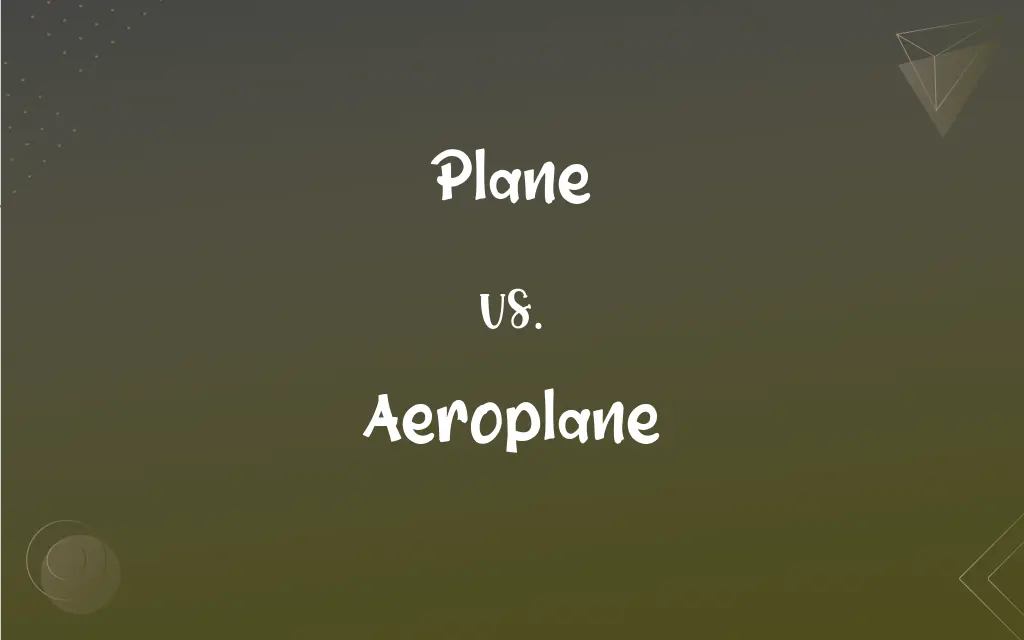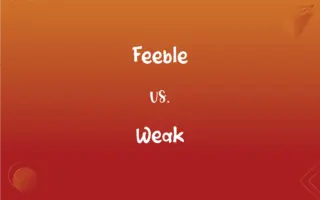Plane vs. Aeroplane: What's the Difference?
Edited by Aimie Carlson || By Janet White || Updated on November 13, 2023
Plane can refer to a flat surface, a tool for shaping wood, or a shortened form of "airplane/aeroplane." Aeroplane specifically refers to a powered flying vehicle with wings.

Key Differences
Plane has multiple meanings; it can refer to a flat, two-dimensional surface in geometry, a carpenter's tool, or as a colloquial shortening for 'airplane/aeroplane.' Aeroplane is more specific, always referring to an aircraft with wings and a propulsion system.
In geometry, plane describes a flat surface extending infinitely in two dimensions. In woodworking, it refers to a tool used to smooth or shape wood. As an abbreviation, it denotes an aircraft. Aeroplane is strictly aviation-related, used to describe a type of aircraft.
Plane as an abbreviation for 'airplane/aeroplane' is more common in casual, colloquial speech. Aeroplane is more formal and is specifically used in British English, whereas 'airplane' is the American equivalent.
The word plane in the context of aircraft is a shortened form that evolved for ease of use. Aeroplane comes from 'aero-' meaning air, and '-plane' from the Greek 'planos' meaning wandering or moving, reflecting its ability to traverse the air.
Plane as a short form for 'airplane' is universally understood, while aeroplane is more commonly used in British English, with 'airplane' being the preferred term in American English.
ADVERTISEMENT
Comparison Chart
Meaning
Can mean a flat surface, a woodworking tool, or a flying vehicle.
Specifically refers to a powered flying vehicle with wings.
Usage
Multiple contexts, including geometry, carpentry, and aviation.
Strictly aviation-related.
Formality
Can be colloquial (in aviation context) or technical.
More formal and specific to aviation.
Etymology
Varied, depending on the context of use.
Derived from 'aero-' (air) and 'plane' (wandering).
Regional Preference
'Plane' as an aircraft is universally used; other meanings vary.
More common in British English; 'airplane' in American English.
ADVERTISEMENT
Plane and Aeroplane Definitions
Plane
A tool used in carpentry for smoothing or shaping wood.
He used a plane to smooth the wooden board.
Aeroplane
A vehicle designed for air travel that has wings and one or more engines.
The aeroplane ascended shortly after takeoff.
Plane
In mathematics, a flat surface extending in height and width but with zero thickness.
Geometric shapes are often drawn on a plane.
Aeroplane
An aircraft propelled by a jet engine or propeller.
She always wanted to pilot an aeroplane.
Plane
A level of existence, thought, or development.
The discussion moved onto a different intellectual plane.
Aeroplane
A machine capable of atmospheric flight due to its wing structure.
The museum exhibits various models of early aeroplanes.
Plane
A flat surface with no thickness and extending infinitely in two dimensions.
The table's surface is a perfect plane.
Aeroplane
In British English, the standard term for what Americans call an airplane.
The aeroplane is an essential mode of international transportation.
Plane
A colloquial term for an aircraft.
We took a plane to New York.
Aeroplane
A powered flying vehicle with fixed wings and a weight greater than that of the air it displaces.
The aeroplane flew smoothly across the sky.
Plane
(Mathematics) A surface containing all the straight lines that connect any two points on it.
Aeroplane
Variant of airplane.
Plane
A flat or level surface.
Aeroplane
A powered heavier-than-air aircraft with fixed wings.
Plane
A level of development, existence, or achievement
Scholarship on a high plane.
Aeroplane
An airfoil.
Aeroplane
Any of various nymphalid butterflies, of various genera, having a slow gliding flight. Also called planes.
Aeroplane
(intransitive) To fly in an aeroplane.
Aeroplane
(transitive) To transport by aeroplane.
Aeroplane
A light rigid plane used in aërial navigation to oppose sudden upward or downward movement in the air, as in gliding machines; specif., such a plane slightly inclined and driven forward as a lifting device in some flying machines. Also called airfoil.
Aeroplane
Hence, a heavier-than-air flying machine using such a device to provide lift. In a modern aeroplane, the airfoils are called the wings, and most of the lift is derived from these surfaces. In contrast to helicopters, the wings are fixed to the passenger compartment (airframe) and do not move relative to the frame; thus such a machine is called a fixed-wing aircraft. These machines are called monoplanes, biplanes, triplanes, or quadruplanes, according to the number of main supporting planes (wings) used in their construction. After 1940 few planes with more than one airfoil were constructed, and these are used by hobbyists or for special purposes. Being heavier than air they depend for their levitation on motion imparted by the thrust from either propellers driven by an engine, or, in a jet plane, by the reaction from a high-velocity stream of gases expelled rearward from a jet engine. They start from the ground by a run on small wheels or runners, and are guided by a steering apparatus consisting of horizontal and vertical movable planes, which usually form part of the wings or tail. There are many varieties of form and construction, which in some cases are known by the names of their inventors. In U.S., an aeroplane is usually called an airplane or plane.
Aeroplane
An aircraft that has a fixed wing and is powered by propellers or jets;
The flight was delayed due to trouble with the airplane
FAQs
Can 'aeroplane' mean anything other than an aircraft?
No, it specifically refers to a type of aircraft.
Are 'plane' and 'aeroplane' interchangeable in aviation?
In casual speech, yes, but 'aeroplane' is more specific.
Do 'plane' and 'aeroplane' have different etymologies?
Yes, 'plane' has multiple origins; 'aeroplane' is aviation-specific.
Is 'plane' used in formal aviation language?
It's more casual; 'airplane' or 'aeroplane' is formal.
Can 'plane' refer to a level of existence?
Yes, but not in the context of aviation.
Is 'plane' a technical term in aviation?
It's more colloquial than technical.
Is 'plane' always short for 'airplane'?
Not always; it depends on the context (e.g., geometry, carpentry).
Is 'aeroplane' a modern term?
Yes, it's related to 20th-century aviation.
Can a 'plane' in geometry fly?
No, in geometry, it refers to a flat surface.
Is 'aeroplane' used in American English?
Less commonly; 'airplane' is the preferred term.
Do 'plane' and 'aeroplane' have different origins?
Yes, based on their varied meanings.
Do all planes have wings?
As aircraft, yes; in other contexts, no.
Are 'plane' and 'aeroplane' used in science?
'Plane' in various sciences, 'aeroplane' in aviation.
Do carpenters use an 'aeroplane'?
No, they use a 'plane' as a tool.
Can 'aeroplane' refer to a private jet?
Yes, as it's a type of aircraft.
Is 'plane' used in mathematics?
Yes, to describe a two-dimensional surface.
Can 'aeroplane' be used metaphorically?
Rarely; it's usually literal.
Are there different types of 'planes'?
Yes, in various contexts (e.g., tools, surfaces).
Is 'plane' ever used in British English for aircraft?
Yes, but 'aeroplane' is more common.
Do 'plane' and 'aeroplane' have the same plural form?
Yes, 'planes' and 'aeroplanes' respectively.
About Author
Written by
Janet WhiteJanet White has been an esteemed writer and blogger for Difference Wiki. Holding a Master's degree in Science and Medical Journalism from the prestigious Boston University, she has consistently demonstrated her expertise and passion for her field. When she's not immersed in her work, Janet relishes her time exercising, delving into a good book, and cherishing moments with friends and family.
Edited by
Aimie CarlsonAimie Carlson, holding a master's degree in English literature, is a fervent English language enthusiast. She lends her writing talents to Difference Wiki, a prominent website that specializes in comparisons, offering readers insightful analyses that both captivate and inform.







































































